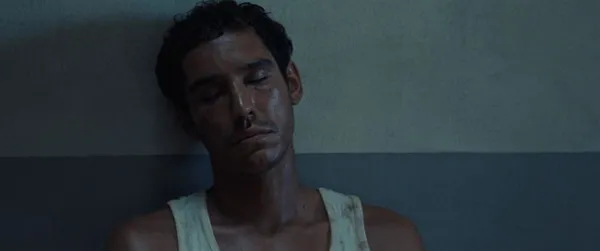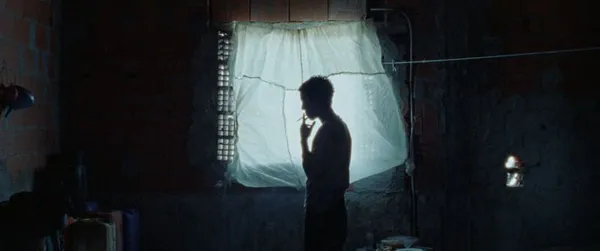Adam Bessa's career continues to impress with his latest film Harka - which is released in the UK tomorrow (May 5). The French-Tunisian star received critical plaudits for Sofia Djama's Algeria-set drama The Blessed and his multilingual skills saw him go on to reach wider audiences with Matthew Michael Carnahan's Mosul and Netflix's Extraction - the sequel to which will air later this year. In the past year, he's been garnering awards heat for his intense central performance in Lotfy Nathan's Harka, winning the Best Actor award in the Un Certain Regard section at Cannes and at the Red Sea Film Festival.
He plays Ali, a Tunisian scraping by as part of the illegal gasoline trade whose dreams of escaping the country for a better life are scuppered after he finds himself trying to look after his two younger sisters (played by Ikbal Harbi and Salima Maatoug) in the wake of his father's death. As the social injustices mount up, the stoic Ali becomes increasingly desperate in a story that was inspired by the real-life tragic immolation protest of Mohamed Bouazizi. We caught up with Bessa ahead of the film's release to talk about his approach to the role.
Tell me about preparing for the role, because I know that Lotfy was inspired to make it by the story of Mohamed Bouazizi, and I wondered whether you had done any research about him?
AB: Yeah, I did search about him but we quickly realised with Lotfy that the story should embrace more of a generation than only him because we realised that 123 people - or around that number - immolated themselves after Mohamed Bouazizi in the years after. So we realised that it was a phenomenon that went beyond him in Tunisia and other countries. So we just tried to create this character that was a representation of a whole generation.
 |
| Adam Bessa as Ali in Harka. Bessa: 'I just love to be honest, to dig into the hidden parts of human beings' Photo: Studio Soho Distribution |
Part of your character is that he's just trying to make himself seen and heard. The tragedy of the film is he doesn't even succeed in that. How did you approach that?
AB: You just go with the script, in terms of you cannot go further. Because I incarnate him. You try not to go ahead of the character - and he doesn't know what's going to happen. The interesting thing is he's not seen or heard.. but he was because after these people, a lot of revolutions happened. I believe that the consequences of acts like that are, maybe we cannot see them right now, but I think they mark people, and then even the younger generation, to not take so much and not to let their dignity be taken away. I think the result of all these actions are absolutely not useless.
How was it to work with Ikbal Harbi and Salima Maatoug, who play Ali's sisters, because they're non-professionals. Did that differ from how you work normally?
AB: It is different. There's sort of godfathering a little bit. You try to be caring and try to be gentle because you're going to take something out of them, as actors, you're going to try to dig from them. So try to be someone who is trustful and try to get them to embark with you in this artistic experiment and try to make them have a taste of what it is to express yourself and how good it feels. They had this brilliant instinct. They have beautiful souls that you can see. So it was really easy and lovely. They did an amazing job. Sometimes easier than professional actors. There's no ego. They're grounded, they know life, they're intelligent and smart.
There's a real complexity to Ali as well. I remember when I saw you in Sofia Djama's The Blessed, that also was a really intense and complex character that you had. Is that something that you're really looking for when you're taking on these roles?
AB: Because I'm realising, like you, that I like them. I believe that human beings are really complex. Despite what they want to tell us, it's not cliched at all. I just love to be honest, to dig into the hidden parts of human beings. Your aggressiveness, your shyness, your whatever, I always like to dig in to see where it comes from. Is it an impact from your environment? Is it something personal? Is it something from your family? Is it something of who you are? And, and always try to dig? Yeah, I think I believe that. Yeah. Humans. I don't think the roles are complex, it's just me. I guess I make them complex at some point. I get along with directors that see complexity, too.
 |
| Golshifteh Farahani as Nik Khan and Adam Bessa as Yaz in Extraction 2. Bessa: 'It is going to be dope' Photo: Courtesy of Netflix |
It's interesting that you talk about the environment, because the environment is quite a big part of this film as well. You can really feel the heat in this movie. Was it quite challenging to shoot some of that, especially because some of it's taking place in cars?.
AB:Absolutely. It was 50 degrees Celsius. I thought the camera was going to melt sometimes. Most of the people that sent me know, some of the French crew or German, like, don't be like, I got scared for them. It changes you completely. It's part of the performance. You become like a phone in economic battery, you just don't spend a lot of energy on anything. Your senses become more accurate about what happens around you. It definitely changes your perception of the world.
Is it right that you did quite a bit of research into the subculture with the petrol and the street selling of it before you started?
AB: Yes, it was something very important, I think, to understand the place he was in and what he was doing. So I hung out a little bit with smugglers.
How was that? I'm imagining that smugglers don't just say, "Oh, yeah, hey, Adam, come join us for a bit let's see how it goes"?
AB: I got introduced by some people, they were locals and in the beginning, for a week maybe, I didn't access them. I just went for coffee and they were there and I'd just chat with them for two minutes. You just have to be accepted. And someday they just say, "Come with us to do this or see this" As soon as they trust you, that's it
Did you discover things that were surprising to you?
AB: They're completely mad? They drive at 220 kilometres an hour in the desert at the night without lights. They're just wild, they don't care. During Covid, the state couldn't really provide masks and tests, machines to breathe for everybody. And they just went and smuggled 4000 machines through Africa and brought them to the country for the people for free.
We're talking about complexity again
AB: They're outlaws but, at the same time, they're kind of heroes a little bit.
You're multilingual and you've also worked in different dialects as well on top of that. Obviously that give you the ability to work across a lot of countries and genres. Is there anything you'd particularly like to do that you haven't done yet?
AB: Maybe more in Western countries. I grew up in France, myself. Maybe (playing) an artist. With Lotfy, we're thinking about that, maybe a painter in the western world in modern times. That could be interesting, you know, in London or in America, where you can exploit the kind of social problems we have here. Economic problems, the prices, immigration problems, the identity problem, I guess, because we're asking ourselves who we are in Europe, we don't know where to place ourselves. So I guess to explore these questions through an artist could be interesting.
So you obviously enjoyed collaborating with Lotfy, then if you're thinking of working together again
AB: He's driven by truth and authenticity, so it's perfect for me. I'm method myself. So I'm pretty driven by the same thing, I really want to touch that right note.
When you say you're "method" I mean, does that mean that you really stay in character when you're shooting
AB: Yeah, to a certain limit. It's complicated. I cannot really go out. I can communicate with you and I'm here and I talk with you, but my mind is always somewhere else and I cannot really go far from a certain mood. In lunch breaks or whatever I feel like it's an ongoing process. As I see it, the method is concentration. It's a huge deep concentration and to let things come to you. It's just like trying not to pollute yourself with something else.
Have you got anything else coming up that we should know about?
AB: Extraction 2 drops on Netflix on 16 June, with Chris Hemsworth. It'sa very good action film that pushed the limit of action, it is going to be dope. And I have another beautiful film, Motherhood, from an American-Tunisian director called Meryam Joobeur. She's in the edit right now and from what I heard, it's brilliant. It's very different, it's going to be very Terrence Malick-y. She's very sensitive,she's really powerful as a director. I think this film is really going to be beautiful and something special.






















